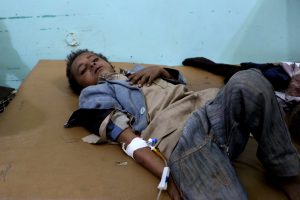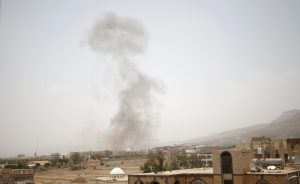
ADEN (Reuters) – Saudi-led coalition air strikes on Thursday killed dozens of people, including children traveling on a bus, in Yemen’s Saada province, Yemeni medical sources and the International Committee of the Red Cross (ICRC) said.
The Western-backed alliance fighting the Iranian-aligned Houthi group in Yemen said in a statement that the air strikes targeted missile launchers used to attack the southern Saudi city of Jizan on Wednesday, killing a Yemeni civilian there.
It accused the Houthis of using children as human shields.
Houthi spokesman Mohammed Abdul-Salam said the coalition showed “clear disregard for civilian life” as the attack had targeted a crowded public place in the city.

A Yemeni boy lies in the hospital after he was injured by an airstrike in Saada, Yemen August 9, 2018./REUTERS/Naif Rahma
The ICRC said one attack hit the bus driving children in Dahyan market, in northern Saada, adding hospitals there had received dozens of dead and wounded.
A Reuters photographer saw bloodied and bandaged children being treated by doctors.
Footage from the Houthi media office showed a boy wearing a blue backpack with a UNICEF logo being carried into a hospital emergency room with blood pouring down his face and over his traditional Yemeni thawb, an ankle-length garment.
Abdul-Ghani Sareeh, head of a health department in Saada, told Reuters that the death toll was to 43, with 61 wounded.
“Scores killed, even more injured, most under the age of 10,” Johannes Bruwer, head of the delegation for the ICRC in Yemen, said in a Twitter post.
It was unclear how many children were killed and how many air strikes were carried out in the area, in northern Yemen, near the border with Saudi Arabia.
“RED LINE”
Saudi Arabia and Sunni Muslim allies intervened in Yemen’s war in 2015 against the Houthis, who control the most populous areas of Yemen, including the capital Sanaa, and drove the internationally recognized government into exile in 2014.
The United States and other Western powers provide arms and intelligence to the alliance, and human rights groups have criticized them over coalition air strikes that have killed hundreds of civilians at hospitals, schools, and markets.
The alliance says it does not intentionally target civilians and has set up a committee to probe alleged mass casualty air strikes, which has mostly cleared the coalition of any blame.
“Today’s attack in Saada was a legitimate military operation … and was carried out in accordance with international humanitarian law,” the coalition said in the Arabic-language statement carried by SPA.
“Targeting Saudis and residents in Saudi is a red line,” coalition spokesman Turki al-Malki later told Al Arabiya TV.
Fragments from the Houthi missile launched at Jizan Industrial City had killed one Yemeni civilian and wounded 11, Saudi state media said earlier on Thursday.
The Houthis have launched a series of missile strikes on the kingdom, including Riyadh, over the past year.
Saada, the main stronghold of the Houthis, has mainly come under air strikes from the coalition as the mountainous province makes battles hard for pro-government ground troops.
The Yemen war has killed more than 10,000 people, displaced more than 2 million and driven the country to the verge of famine, according to the United Nations.
(Corrects official’s name in paragraph 8 to Abdul-Ghani Sareeh from Abdul-Ghani Nayeb)
(Reporting by Dubai Newsroom; Writing and additional reporting by Aziz El Yaakoubi; Editing by Alison Williams)



